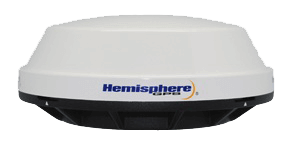A21 Antenna
The A21™ antenna is designed to help maintain tracking of GPS and differential correction signals in challenging environments. Sometimes keeping the antenna level and away from electrical noise is just not possible. With a metal base, lower profile, improved multi-path mitigation, and ability to filter out an additional 30 decibels of radio band frequencies, A21 offers superior noise rejection. A21 is designed for use with Hemisphere GPS Crescent® and Crescent Vector II™ receivers. To view more information click here.
Key A21 Specification: [GPS, SBAS and L-band (OmniSTAR®) Antenna]
-
GNSS Sensor
GNSS Reception: GPS L1, SBAS, and L-band
(OmniSTAR)
GNSS Frequency: 1.525 to 1.585 GHz
LNA Gain: 30 dB
LNA Noise: 2.0 dB, typical -
L-Band Sensor
L-Band Frequency: 1.525 - 1.585 GHz
L-Band LNA Gain: 30 dB -
Power Input
Input Voltage: 3.3 to 12 VDC
Input Current: 24 mA, typical
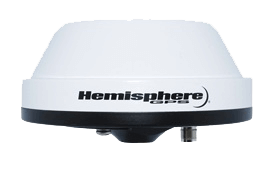
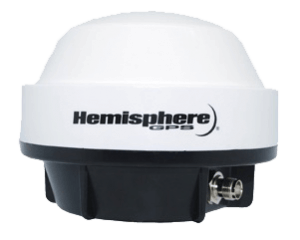
A31 Antenna
The A31™ antenna is designed to help maintain tracking of GPS, Beacon and differential correction signals in challenging environments. Sometimes keeping the antenna level and away from electrical noise is just not possible. With improved multi-path mitigation and ability to filter out an additional 30 decibels of radio band frequencies, A31 offers superior noise rejection. The A31 is designed for use with Hemisphere GPS Crescent and Crescent Vector II receivers. To view more information click here.
Key A31 Specification: [GPS, SBAS, L-band (OmniSTAR®) and Beacon Antenna]
-
GNSS Sensor
GNSS Reception: GPS, SBAS, L-band (OmniSTAR) and Beacon
GNSS Frequency: 1.575 GHz (L1)
LNA Gain: 30 dB
LNA Noise: < 2.0 dB -
L-Band Sensor
L-Band Frequency: 1.525 - 1.585 GHz
L-Band LNA Gain: 30 dB
-
Beacon Sensor
Beacon Frequency: 283.5 - 325 KHz
Beacon LNA Gain: 30 dB -
Power Input
Input Voltage: 5 to 12 VDC
Input Current: 50 - 60 mA
A42 Antenna
The new A42™ antenna adds precision, reliability and value to our leading Eclipse™ GPS technology. A42 is a multi-GNSS precision antenna and is ideal for various applications including construction surveys, RTK positioning and navigation, precise guidance and machine control. Use the A42 antenna in challenging environments (such as near buildings and foliage) as it has superior multipath mitigation, stable phase center and strong SNR’s even at low elevations. To view more information click here.
Key A42 Specification: [Multi-GNSS Antenna]
-
GNSS Sensor
GNSS Reception: GPS L1/L2/L5, GLONASS L1/L2,
Beidou, SBAS, L-band DGNSS/HP/XP
(OmniSTAR),
and Galileo E1/E5a and b
Channels: 270
GNSS Frequency: 1.165 to 1.253 GHz
1.525 to 1.613 GHz
LNA Gain: 30 dB
LNA Noise: 2.0 dB, typical -
Power Input
Input Voltage: 3.3 to 12 VDC
Input Current: 35 mA, typical
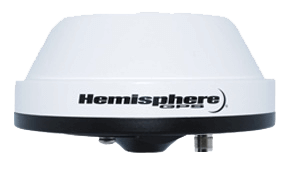
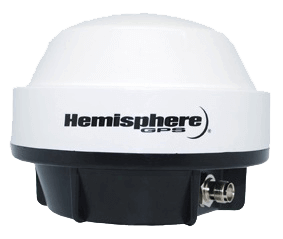
A43 Antenna
The new A43™ antenna adds precision, reliability and value to our leading Eclipse™ GPS technology. The A43 antenna is a multi-GNSS precision antenna and is ideal for various applications including construction surveys, RTK positioning and navigation, precise guidance and machine control. Use the A43 antenna in challenging environments (such as near buildings and foliage) as it has superior multipath mitigation and strong SNR’s, even at low elevations. To view more information click here.
Key A43 Specification: [Multi-GNSS Precision Antenna]
-
GNSS Sensor
GNSS Reception: GPS L1/L2/L5, GLONASS L1/L2, Beidou, SBAS, and OmniSTAR®, and Galileo E1/E5a and b
GNSS Frequency: 1.165 to 1.253 GHz
1.525 to 1.613 GHz
LNA Gain: 28 +/-3 dB, typical
LNA Noise: 2.0 dB, typical -
Beacon Sensor
Beacon Frequency: 283.5 - 325 KHz
Beacon LNA Gain: 28 +/-3 dB, typical -
L-band Sensor
L-band frequency: 1.525 - 1.585 GHz
L-band LNA Gain: 28 +/-3 dB, typical -
Power
Input Voltage: 5-12 VDC
Input Current: 50-60 mA
A52 Antenna
The new A52™ antenna adds more precision, reliability and value to our leading Eclipse GPS technology. A52 is a multi-GNSS precision antenna and is ideal for various applications including geodetic surveys, RTK positioning and navigation, precise guidance and machine control. Use the A52 antenna in challenging environments (such as near buildings and foliage) as it has superior multipath mitigation, stable phase center and strong SNR’s even at low elevations. To view more information click here.
Key A52 Specification: [Multi-GNSS Antenna]
-
GNSS Sensor
GNSS Reception: GPS L1/L2/L5, GLONASS L1/L2, Beidou,
SBAS, L-band DGNSS/HP/XP (OmniSTAR),
and Galileo E1/E5a and b
Channels: 270
GNSS Frequency: 1.165 to 1.253 GHz
1.525 to 1.613 GHz
LNA Gain: 30 dB
LNA Noise: 2.0 dB, typical -
Power Input
Input Voltage: 3.3 to 12 VDC
Input Current: 35 mA, typical - Phase Center Variation
Less than 3 mm at GPS L1 and L2, for elevations above 15 degrees
